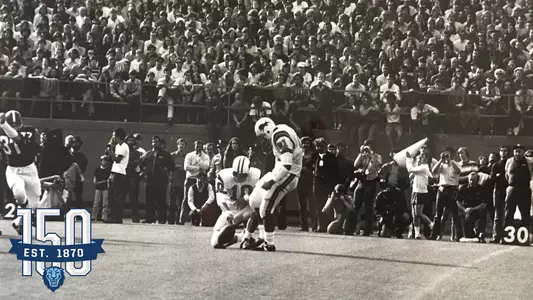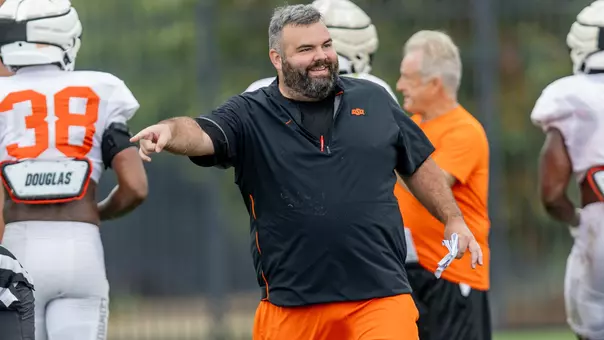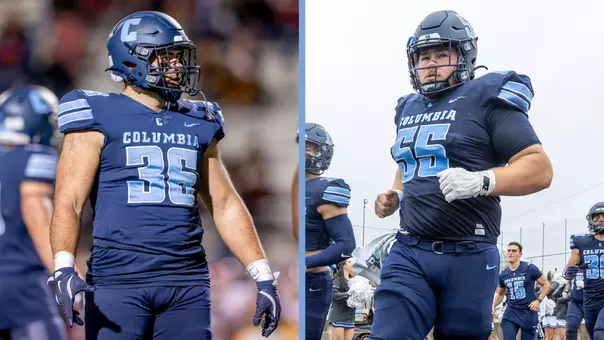
Football's All-Time Top-10 Upset Victories
9/4/2020 4:51:00 PM | Football
CUFootball150 Feature PageVote for the Columbia Football All-150 TeamSubmit Your Favorite Columbia Football Memory or MomentColumbia Football's Top-10 Game-Winning PlaysColumbia to Celebrate 150-Year Anniversary of Football
Three of the top upsets are following Columbia's inclusion into the Ivy League.
NEW YORK—This is the second in a #CUFootball150 feature series on Top-10 Historical Lists for Columbia Football. Today we look at a list of Columbia Football's all-time Top-10 Upset Victories.
Follow Columbia Football: TWITTER | FACEBOOK | INSTAGRAM
10. Oct. 31, 2015 (Columbia 17, Yale 7)
Columbia wins for the first time at the Yale Bowl since 1996 as the Lions give new head coach Al Bagnoli his first Ivy League victory at Columbia, a 17-7 victory over Yale. Columbia's defense rises to the occasion as it holds Yale to an Ivy League school-record 120 total offensive yards, five first downs, and -14 rushing yards. Hank Trumbull ties the game on a touchdown pass from Skyler Mornhinweg in the second quarter and punter/placekicker Cameron Nizialek gives the Lions a 10-7 lead on a career-long 40-yard field goal in the third quarter. The Lions add an insurance score in the fourth quarter when Nizialek takes a pitch on a fake field goal attempt and runs 13 yards for a touchdown.
9. Nov. 14, 1925 (Columbia 21, Army 7)
Columbia scores its first major victory since football was restored in 1915, downing Army 21-7 at the Polo Grounds. Ray Kirchmeyer scores one of the touchdowns on a 60-yard run. The Lions end up finishing the 1925 season with a 6-3-1 under Head Coach Charles F. Crowley.
8. Oct. 17, 1931 (Columbia 19, Dartmouth 6)
Described as one of the most satisfying triumphs at Columbia up until that time, Columbia claims a key 19-6 national-headline grabbing win over a strong Dartmouth team at Baker Field. Columbia rushes for a combined 154 yards and lineman Tony "Red" Matal blocks three punts, including a second quarter swat which he recovered and raced in for the Lions' second touchdown of the day. The win improves the Lions to 4-0 on the year and is viewed as the Columbia program's "come-of-age" victory. Fans rush the field and tear down the goal posts. The Lions go on to finish 7-1-1 in 1931, 7-1-1 in 1932, 8-1 in 1933, and 7-1 in 1934.
7. Nov. 8, 2003 (Columbia 16, No. 23 Harvard 13)
Columbia upsets No. 23 ranked Harvard 16-13 at Baker Field. A 10-yard pass from Jeff Otis to Zach Van Zant with 1:08 to go keys Columbia's comeback victory. The Lions rally from a 13-6 deficit as the defense shuts out Harvard the rest of the way and holds the Crimson to just 56 total offensive yards in the second half. Nick Rudd converts a 19-yard field goal after a 90-play, 14-play drive in the third quarter, then Prosper Nwokocha intercepts a pass and returns it 22 yards to set up the game-winning touchdown. Otis throws for 253 yards, Wade Fletcher catches nine passes for 107 yards and Stephen McCoy (two sacks) and Adam Brekke each lead the defense with 12 tackles. Current Columbia Director of Personnel Mike DeFazio rushes five times and catches three passes in the victory.
6. Oct. 8, 1988 (Columbia 16, Princeton 13)
Columbia wins its first-ever game at Lawrence A. Wien Stadium with a 16-13 Homecoming victory over Princeton. Solomon Johnson's 2-yard touchdown run with under five minutes to play seals the win. Princeton has one last chance to tie the game, but a 49-yard field goal falls short in the closing seconds. Columbia's Greg Abbruzzese rushes for 182 yards on 37 carries. The win also snaps the program's 44-game losing streak.
5. Oct. 7, 1995 (Columbia 24, No. 13 Penn 14)
Columbia upsets No. 13 ranked and undefeated Penn 24-14 at Lawrence A. Wien Stadium. Trailing 14-10 in the third quarter, Columbia scores on a 39-yard punt return touchdown by Roy Hanks, then Columbia's Eric Keck recovers a fumble caused by Charles Bettinelli which leads to a 2-yard touchdown run by Mike Cavanaugh to seal the win. On defense, Rory Wilfork totals 16 tackles, one sack and 4.0 tackles for loss for Columbia. At the time, current Head Coach Al Bagnoli was Penn's head coach and current offensive coordinator Mark Fabish finished the game with six receptions for 94 yards and a 40-yard touchdown for the Quakers.
4. Oct. 28, 1899 (Columbia 5, Yale 0)
Walter Camp All-American Harold Weekes scores on a brilliant 70-yard run for a touchdown and the Lions' defense shuts down the Bulldog offense to give Columbia a 5-0 triumph over Yale at Manhattan Field in New York City. Yale came into the game rated by the national media as "invincible." All-American William Morley also stars in the victory which proves to be a powerful force in putting the Lions among the national football elite.
3. Nov. 6, 1971 (Columbia 31, Dartmouth 29)
Nationally-acclaimed linebacker Paul Kaliades kicks a game-winning field goal with 48 seconds to play to defeat Dartmouth 31-29 at Baker Field. Kaliades' kick barely clears the goal post as the Lions stun Dartmouth, which entered the contest in first place in the Ivy League and with a 15-game win streak intact. Kaliades also handled placekicking duties as one of Columbia's last straight-ahead kickers. The Lions a built a 28-14 third quarter lead on two Don Jackson touchdown passes, but Dartmouth battles back to take a 29-28 lead. Jackson throws for 160 yards on the day. The victory jumpstarts Columbia as it wins its final three games en route to a 6-3 overall record and 5-2 third-place finish in the Ivy League.
2. Jan. 1, 1934 (Columbia 7, Stanford 0)
In one of the greatest upsets in college football history, Columbia conquers Stanford 7-0 in the Rose Bowl game in Pasadena. The victory upset the predictions of the college football world and placed Columbia among the greatest teams in the long and brilliant history of the sport. Although Columbia had a strong record (7-1), undefeated Stanford was heavily favored to win and had been scored on only four times during the 1933 season. It was Columbia's defense that was the key as it took advantage of a wet field and forced multiple fumbles to end numerous Stanford scoring drives. Behind All-America quarterback Cliff Montgomery, Columbia began moving the ball in the second quarter and after he completed a pass to Tony "Red" Matal for a first down at the Stanford 17-yard line, Columbia Head Coach Lou Little called his special play "KF-79." Montgomery faked a handoff to halfback Ed Brominski, who sprinted to the right with the entire Stanford defense in full pursuit. But the quarterback pulled the ball back and handed it off to his fullback, Ed Barabas, who sped around the left end with no blockers in sight. Barabas raced into the end zone untouched and Newell "Newt" Wilder followed with the extra point for a 7-0 Columbia halftime lead. Columbia's defense rose to the occasion in the second half and stopped Stanford multiple times. With the win, Columbia is crowned the "mythical' national champion of college football. At the time, the Rose Bowl was the only bowl game being played.
1. Oct. 2, 1947 (Columbia 21, No. 6 Army 20)
Before a Baker Field capacity crowd of 35,000, Columbia's 21-20 upset victory snaps Army's 32-game unbeaten streak. The victory is still ranked as one of the top upsets in college football history. With a 3-0-1 record (including a 0-0 tie vs. Illinois), Army entered the game undefeated after having outscored its opponents 93-0 and famed journalist Red Smith called the elusive victory over Army "the quarry which the entire American football pack harried for three years, 10 months and 29 days." Columbia needed to claw back from a 20-7 halftime deficit. In the second half, Columbia's unorthodox passing attack allowed it to battle back into the game as quarterback Eugene Rossides began finding end Bill Swiacki. On a crucial play late in the game, Swiacki leaps and makes a diving catch of a Rossides pass at the 4-yard line to set up a game-winning 2-yard touchdown run by Louis Kusserow. Ventan Yablonski converts the extra point for a 21-20 lead. Six minutes and 42 seconds later after Rossides intercepts an Army pass, fans storm the field and tear down the north end goal posts. Including the win, Columbia wins its last five games and finishes ranked No. 20 nationally with a 7-2 overall record.
Follow Columbia Football: TWITTER | FACEBOOK | INSTAGRAM
10. Oct. 31, 2015 (Columbia 17, Yale 7)
Columbia wins for the first time at the Yale Bowl since 1996 as the Lions give new head coach Al Bagnoli his first Ivy League victory at Columbia, a 17-7 victory over Yale. Columbia's defense rises to the occasion as it holds Yale to an Ivy League school-record 120 total offensive yards, five first downs, and -14 rushing yards. Hank Trumbull ties the game on a touchdown pass from Skyler Mornhinweg in the second quarter and punter/placekicker Cameron Nizialek gives the Lions a 10-7 lead on a career-long 40-yard field goal in the third quarter. The Lions add an insurance score in the fourth quarter when Nizialek takes a pitch on a fake field goal attempt and runs 13 yards for a touchdown.
9. Nov. 14, 1925 (Columbia 21, Army 7)
Columbia scores its first major victory since football was restored in 1915, downing Army 21-7 at the Polo Grounds. Ray Kirchmeyer scores one of the touchdowns on a 60-yard run. The Lions end up finishing the 1925 season with a 6-3-1 under Head Coach Charles F. Crowley.
8. Oct. 17, 1931 (Columbia 19, Dartmouth 6)
Described as one of the most satisfying triumphs at Columbia up until that time, Columbia claims a key 19-6 national-headline grabbing win over a strong Dartmouth team at Baker Field. Columbia rushes for a combined 154 yards and lineman Tony "Red" Matal blocks three punts, including a second quarter swat which he recovered and raced in for the Lions' second touchdown of the day. The win improves the Lions to 4-0 on the year and is viewed as the Columbia program's "come-of-age" victory. Fans rush the field and tear down the goal posts. The Lions go on to finish 7-1-1 in 1931, 7-1-1 in 1932, 8-1 in 1933, and 7-1 in 1934.
7. Nov. 8, 2003 (Columbia 16, No. 23 Harvard 13)
Columbia upsets No. 23 ranked Harvard 16-13 at Baker Field. A 10-yard pass from Jeff Otis to Zach Van Zant with 1:08 to go keys Columbia's comeback victory. The Lions rally from a 13-6 deficit as the defense shuts out Harvard the rest of the way and holds the Crimson to just 56 total offensive yards in the second half. Nick Rudd converts a 19-yard field goal after a 90-play, 14-play drive in the third quarter, then Prosper Nwokocha intercepts a pass and returns it 22 yards to set up the game-winning touchdown. Otis throws for 253 yards, Wade Fletcher catches nine passes for 107 yards and Stephen McCoy (two sacks) and Adam Brekke each lead the defense with 12 tackles. Current Columbia Director of Personnel Mike DeFazio rushes five times and catches three passes in the victory.
6. Oct. 8, 1988 (Columbia 16, Princeton 13)
Columbia wins its first-ever game at Lawrence A. Wien Stadium with a 16-13 Homecoming victory over Princeton. Solomon Johnson's 2-yard touchdown run with under five minutes to play seals the win. Princeton has one last chance to tie the game, but a 49-yard field goal falls short in the closing seconds. Columbia's Greg Abbruzzese rushes for 182 yards on 37 carries. The win also snaps the program's 44-game losing streak.
5. Oct. 7, 1995 (Columbia 24, No. 13 Penn 14)
Columbia upsets No. 13 ranked and undefeated Penn 24-14 at Lawrence A. Wien Stadium. Trailing 14-10 in the third quarter, Columbia scores on a 39-yard punt return touchdown by Roy Hanks, then Columbia's Eric Keck recovers a fumble caused by Charles Bettinelli which leads to a 2-yard touchdown run by Mike Cavanaugh to seal the win. On defense, Rory Wilfork totals 16 tackles, one sack and 4.0 tackles for loss for Columbia. At the time, current Head Coach Al Bagnoli was Penn's head coach and current offensive coordinator Mark Fabish finished the game with six receptions for 94 yards and a 40-yard touchdown for the Quakers.
4. Oct. 28, 1899 (Columbia 5, Yale 0)
Walter Camp All-American Harold Weekes scores on a brilliant 70-yard run for a touchdown and the Lions' defense shuts down the Bulldog offense to give Columbia a 5-0 triumph over Yale at Manhattan Field in New York City. Yale came into the game rated by the national media as "invincible." All-American William Morley also stars in the victory which proves to be a powerful force in putting the Lions among the national football elite.
3. Nov. 6, 1971 (Columbia 31, Dartmouth 29)
Nationally-acclaimed linebacker Paul Kaliades kicks a game-winning field goal with 48 seconds to play to defeat Dartmouth 31-29 at Baker Field. Kaliades' kick barely clears the goal post as the Lions stun Dartmouth, which entered the contest in first place in the Ivy League and with a 15-game win streak intact. Kaliades also handled placekicking duties as one of Columbia's last straight-ahead kickers. The Lions a built a 28-14 third quarter lead on two Don Jackson touchdown passes, but Dartmouth battles back to take a 29-28 lead. Jackson throws for 160 yards on the day. The victory jumpstarts Columbia as it wins its final three games en route to a 6-3 overall record and 5-2 third-place finish in the Ivy League.
2. Jan. 1, 1934 (Columbia 7, Stanford 0)
In one of the greatest upsets in college football history, Columbia conquers Stanford 7-0 in the Rose Bowl game in Pasadena. The victory upset the predictions of the college football world and placed Columbia among the greatest teams in the long and brilliant history of the sport. Although Columbia had a strong record (7-1), undefeated Stanford was heavily favored to win and had been scored on only four times during the 1933 season. It was Columbia's defense that was the key as it took advantage of a wet field and forced multiple fumbles to end numerous Stanford scoring drives. Behind All-America quarterback Cliff Montgomery, Columbia began moving the ball in the second quarter and after he completed a pass to Tony "Red" Matal for a first down at the Stanford 17-yard line, Columbia Head Coach Lou Little called his special play "KF-79." Montgomery faked a handoff to halfback Ed Brominski, who sprinted to the right with the entire Stanford defense in full pursuit. But the quarterback pulled the ball back and handed it off to his fullback, Ed Barabas, who sped around the left end with no blockers in sight. Barabas raced into the end zone untouched and Newell "Newt" Wilder followed with the extra point for a 7-0 Columbia halftime lead. Columbia's defense rose to the occasion in the second half and stopped Stanford multiple times. With the win, Columbia is crowned the "mythical' national champion of college football. At the time, the Rose Bowl was the only bowl game being played.
1. Oct. 2, 1947 (Columbia 21, No. 6 Army 20)
Before a Baker Field capacity crowd of 35,000, Columbia's 21-20 upset victory snaps Army's 32-game unbeaten streak. The victory is still ranked as one of the top upsets in college football history. With a 3-0-1 record (including a 0-0 tie vs. Illinois), Army entered the game undefeated after having outscored its opponents 93-0 and famed journalist Red Smith called the elusive victory over Army "the quarry which the entire American football pack harried for three years, 10 months and 29 days." Columbia needed to claw back from a 20-7 halftime deficit. In the second half, Columbia's unorthodox passing attack allowed it to battle back into the game as quarterback Eugene Rossides began finding end Bill Swiacki. On a crucial play late in the game, Swiacki leaps and makes a diving catch of a Rossides pass at the 4-yard line to set up a game-winning 2-yard touchdown run by Louis Kusserow. Ventan Yablonski converts the extra point for a 21-20 lead. Six minutes and 42 seconds later after Rossides intercepts an Army pass, fans storm the field and tear down the north end goal posts. Including the win, Columbia wins its last five games and finishes ranked No. 20 nationally with a 7-2 overall record.
Highlights: FB | Columbia 29, Cornell 12
Saturday, November 22
Preview: FB | Coach Poppe - Week 10 | Presented by Amity Hall Uptown
Friday, November 21
Podcast: FB | Captains' Corner (S7, E10)
Thursday, November 20
Postgame: FB | Coach Poppe after Brown
Saturday, November 15











